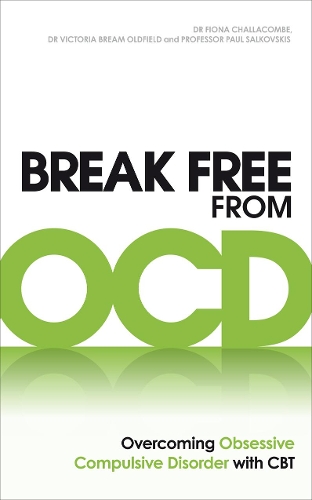
Break Free from OCD: Overcoming Obsessive Compulsive Disorder with CBT
(Paperback)
Publishing Details
Break Free from OCD: Overcoming Obsessive Compulsive Disorder with CBT
By (Author) Dr. Fiona Challacombe
By (author) Dr. Victoria Bream Oldfield
By (author) Paul M Salkovskis
Ebury Publishing
Vermilion
15th September 2011
1st September 2011
United Kingdom
Classifications
General
Non Fiction
Self-help, personal development and practical advice
Psychology
Psychotherapy
616.85227
Physical Properties
Paperback
304
Width 136mm, Height 216mm, Spine 23mm
299g
Description
An extensive and practical guide to overcoming OCD through cognitive behavioural therapy (CBT) Are you plagued by obsessive thoughts, rituals or routines Would you like to regain control over your behaviour and cast your fears aside Whether you are compelled to wash your hands more and more thoroughly or feel the need to keep checking that you've turned off appliances, obsessive worries can be a drain on daily life. However, you don't need to suffer any more. This practical guide, written by three leading cognitive behavioural therapy experts, enables you to make sense of your symptoms, and gives a simple plan to help you conquer OCD. Includes- detailed information on the many different manifestations of OCD; the differences between normal and obsessive worries; clear information on treating your individual problem; real-life case studies and examples; and advice and support for friends and family of OCD sufferers. Whether your condition is mild or severe, this definitive resource will help you reclaim your life and keep OCD away for good.
Reviews
My number one recommendation OCD self-help book. * Ashley Fulwood, Chief Exec of OCD-UK *
Author Bio
Dr Fiona Challacombe is a research fellow and clinical psychologist working at Kings College London and the Maudsley Centre for Anxiety Disorders and Trauma. She is part of a national specialist service treating individuals with severe and complex OCD. Her research focuses on the impact of OCD on parenting and families, and investigating the delivery and refinement of CBT for parents with OCD. Dr Victoria Bream Oldfield is a Clinical Psychologist working at the Centre for Anxiety Disorders and Trauma, Maudsley Hospital, London. She studied experimental psychology at the University of Oxford, clinical psychology at the Institute of Psychiatry, King's College London, and trained in CBT at the University of Oxford. Her research interests are in the phenomenology and treatment of OCD. Professor Paul Salkovskis is Professor of Clinical Psychology and Applied Science and Programme Director of the forthcoming doctorate programme in clinical psychology at the University of Bath. He is editor of the scientific journal Behavioural and Cognitive Psychotherapy and a Fellow of the British Psychological Society. He has published over 250 scientific papers and recently received the Aaron T Beck award for contributions to cognitive therapy.
